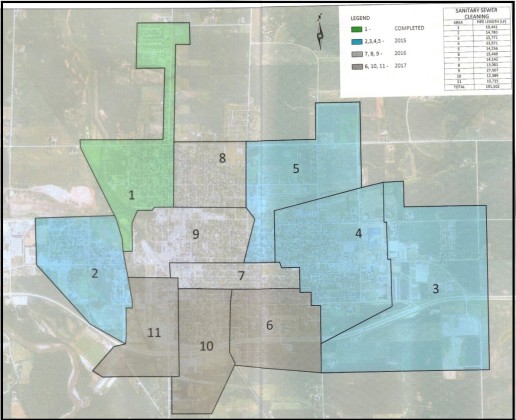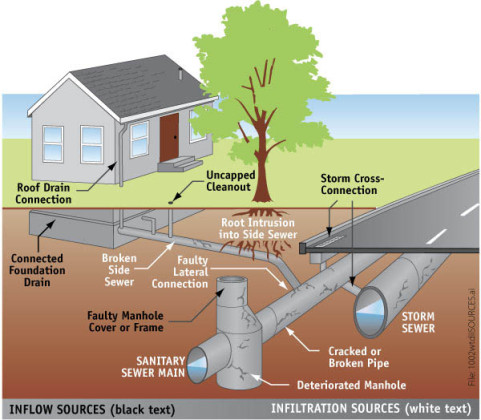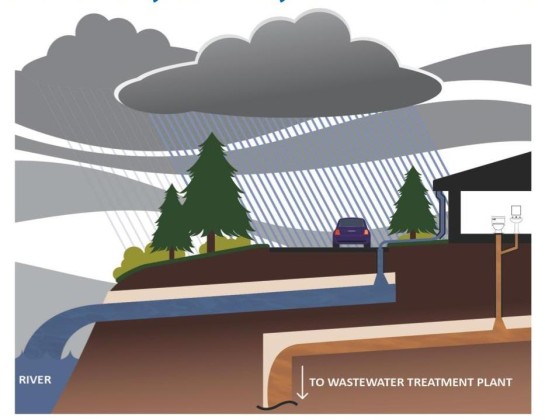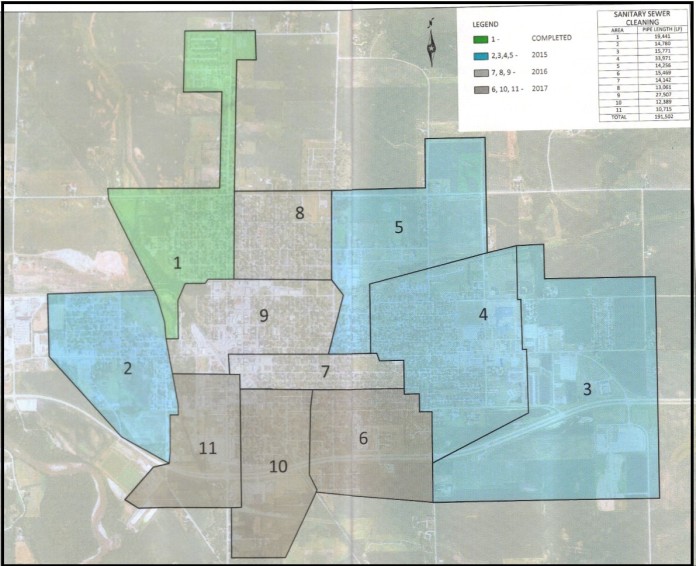
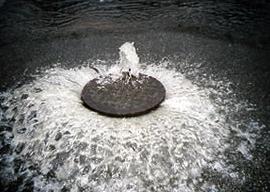
June’s heavy rains returned this month, with basements again flooding in a number of Perry homes even as complaints about the city’s sewer system have continued to bubble up at Perry City Council meetings all summer.
In July the city’s public works department suspected residential sump pumps might be the main culprits, illegally discharging into the sanitary sewer and causing the surcharged system and flooded basements. But Perry City Administrator Sven Peterson told the city council last week the focus has now extended to other — and potentially more expensive — causes of infiltration and inflow.
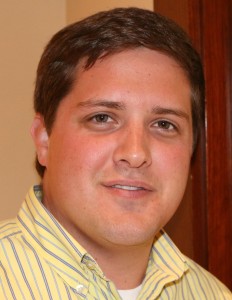
“The more times that we go through this,” Peterson said, “we’re noticing within 30 minutes of the rainfall, it’s backing up, sewers are full, so more and more we’re thinking it’s not so much of a sump-pump issue. The sump pumps are what keep the pipes half-full four days later. This backing up as it’s raining, there’s direct inflow into the sewer system that we just have to find. Hopefully that’s what we’re going to be finding and addressing.”
June records from the city’s wastewater treatment plant, when the Perry area received as much as nine inches of rain in a short period, showed water volume at the plant spiked from a daily rate of about 700,000 gallons to more than 14 million gallons.
Rain events of that magnitude will overwhelm any municipal system, according to Perry Public Works Director Jack Butler.
“When you get rains like that and flood the system like that, it’s just not made to handle it,” Butler said. “But if we get some of the things controlled, we would help ourselves and help the homeowners.”
The Public Works Committee of the Perry City Council is looking at options for solving the sewer troubles. The committee is composed of Peterson, Butler, Assistant Public Works Director Josh Wuebker, Bolton and Menk engineering consultant Matt Ferrier and council members Chuck Schott and Dr. Randy McCaulley.
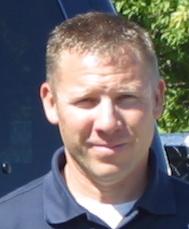
“There is no easy answer for it all,” Butler said. “It’s a big headache. We’re going to have to sit down and put our heads together and study it. What do we want to come up with?”
Butler said public interest in the state of the city’s sewers is high because of the recent flooding.
“Right now it’s fresh because most of the people in town had damage, and they would like to see something happen,” he said. “But if it dries out here and for the next two years we don’t have any rain, nobody cares until we get that five-inch rain and the system overloads, and now everybody’s mad at us again.”
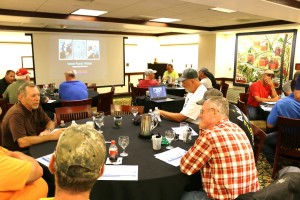
Butler assured the council the problems are not only Perry’s. A meeting of public works directors from around Iowa and the Midwest was convened at the Hotel Pattee in August, and it showed how widely shared are the challenges to municipal sewer systems.
Like all cities, Perry separates its sanitary sewer lines from its stormwater sewer lines, but that was not always the case. Combined sewer systems were the norm in Iowa from the mid-1800s until well into the 20th century.
As recently as the 1940s, untreated human waste was discharged directly into Iowa’s rivers and streams, according to Adam Schneiders, water quality coordinator with the Iowa Department of Natural Resources.
With the rise of public-health regulations and the development of modern technologies of centralized wastewater treatment, the quality of waters in Iowa and around the U.S. greatly increased. Stormwater sewers and sanitary sewers are now kept separate, with sanitary sewers the standard way to transport wastewater to centralized wastewater treatment facilities. Construction of new combined sewers is prohibited.
At the same time, crumbling infrastructure is a problem across Iowa. Just as with our roads and bridges, many municipal sewer systems have grown old and decayed. Perry’s sewers are in this class, with parts of the city’s system more than 100 years old and possibly including vestiges of an earlier combined system.
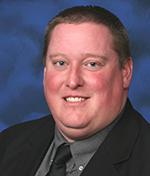
Long-deferred maintenance now threatens to make large-scale, high-cost replacements necessary. For instance, the six-block sewer main replacement in 2007 along north Second Street cost more than $1 million, according to Ferrier, the city’s engineering consultant.
“The Second Street job took 150 to 200 acres of drainage out of the sanitary sewer system,” Ferrier said. Prior to the redesign, the stormwater runoff from land lying north of Park Street fed directly into the sanitary sewer and was treated at the wastewater treatment plant at taxpayer expense, he said.
“We’ve done several projects over 15 years of taking those off the sanitary sewer system,” Ferrier said. “As Perry grew over time, there were several county tiles that were eventually converted into sanitary sewers. We’ve found that in several areas of town. That happens all over the state of Iowa. It’s not uncommon.”
Eliminating similar cases of stormwater inflow into the sanitary sewer system has been the goal of ongoing efforts, but the recent heavy rains show the goal is still some ways away. Information is crucial to the process, and the first order of business is determining the true condition of Perry’s sewers.
The city has begun a four-year process of jetting and cameraing the sanitary sewer system in order to find any gaps, cracks or voids in the lines, including sometimes even the complete absence of piping. Sending a camera along the cleared lines gives the plainest proof of their condition.
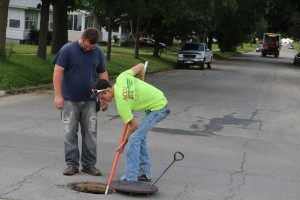
Two sewer-cleaning and repair companies, Accu-Jet, a Perry firm, and Des Moines-based Jet Surge, have contracted with the city to do the jetting and cameraing work, which is now about one-third complete.
Peterson told the council last week the city will also soon conduct a smoke test in which non-toxic blue smoke will be forced into the sanitary sewer lines. Escaping smoke will rapidly reveal gaps in the sanitary system and points of connection with the stormwater system.
Repairs will be possible on less damaged lines, Peterson told the council, ranging from spot repairs to lining the interior of a sewer pipe with a plastic material.
“That’s a great first step,” Perry City Council member John Andorf said, “but people are going to have to understand and realize that, unfortunately, it’s not something that’s going to be corrected overnight.”
“It’s going to be a long-term process,” Peterson said. “We’re finding the issues now so that, hopefully, this winter we can put together a good grant and win that and, hopefully, fix it next summer or the summer after that.”
Having up-to-date information about the system could also help in landing money for the infrastructure improvements, which are costly challenges to small communities. Peterson told the council once he has complete and accurate information, he intends over the winter to put together an application for a federal Community Development Block Grant (CDBG).
Towns the size of Perry are eligible for as much as $600,000 in CDBG funds for storm sewer projects related to sanitary sewer system improvements, but cities must match the federal dollars one for one.
A second possible source of federal money is the Federal Emergency Management Administration (FEMA) fund for disaster recovery. FEMA announced in August approval of a Presidential Disaster Declaration for 19 Iowa counties impacted by June’s severe weather. Dallas County is among the counties eligible for the federal relief money.
The Presidential Disaster Declaration for Public Assistance puts into motion long-term federal recovery programs designed to help public entities repair or replace disaster-damaged facilities, including debris removal, emergency protective measures, repair of damaged public property, loans needed by communities for essential government functions and grants for public schools.
The Presidential Disaster Declaration will also fund hazard mitigation efforts, helping towns like Perry minimize the impact of future disasters by taking proactive steps to strengthen existing infrastructure.
Perry residents already contribute to the upkeep of their sewer system. Customers of the Perry Water Works pay a $3 monthly stormwater discharge fee that covers routine maintenance and repairs, and Peterson said a small increase in the fee is one possible source of additional funds.
It has taken some parts of Perry’s sewers 100 years to get to their present state, and repairing or replacing them will take time.
“I think on the part of everyone it’s going to be patience and scrambling for the resources to make the repairs that need to be done,” Perry Mayor Jay Pattee said last week.
Video courtesy Pegasus TV12 volunteers Keith Knoll and Doug Wood
The issues were again addressed at the July 20 city council meeting by Perry Public Works Director Jack Butler.
The question of city sewers arose again at the August 3 meeting of the Perry City Council. City Administrator Sven Peterson and Mayor Jay Pattee both addressed the issue, and Gene Heimerman, 1705 Lucinda St. in Perry, brought his concerns to the council’s attention in the meeting’s open forum.
The August 17 meeting of the Perry City Council brought further discussion of recent action.
The September rains brought the sewer question to the fore once again at the Sept. 8 city council meeting. City Administrator Sven Peterson brought the council up to speed on the latest developments.
https://youtu.be/QeAleWjg_s8
The mayor and council also commented on the sewer situation.
https://youtu.be/Ze1CtrTLxfc








